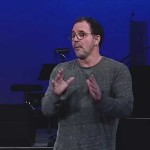We run our website the way we wished the whole internet worked: we provide high quality original content with no ads. We are funded solely by your direct support. Please consider supporting this project.

When God Discovers
Scripture consistently portrays God’s knowledge as conforming to the ways things really are, and part of the way things really are is temporally conditioned. Scripture never expresses the commonly-held sentiment that time is somewhat illusory. God “remembers” the past and anticipates the future. Insofar as he empowers humans to freely determine the future, this means that God waits “to see” what shall come to pass.
In Gen 2:19, after God created the animals, he brought them before Adam “to see what he would call them.” This word “to see” means something like “to discover.” God’s sovereign control of the world does not rule out an element of uncertainty about the future. God empowers humans to be genuine partners in bringing about the future, and this means that the future is, to some extent, dependent on what we do. God waits to see how humans will choose.
Another example is found when the Lord forbids the Israelites from gathering more than a day’s ration of bread from heaven when they were in the wilderness because he wants to “test them, whether they will follow my instruction or not” (Ex 16:4). By the Lord’s own admission, there would have been no point for this testing if the Lord was already certain how they would behave.
God tested Abraham to see how he would respond when asked to sacrifice Isaac (Gen 22). Moses tells the Israelites that they wandered in the wilderness for 40 years so that they Lord would know their heart (Deut 8:2). The Lord temporarily withdrew support from Israel to “find out if they would obey the command of the Lord” (Judg 3:4). God leaves Hezekiah “to himself” at one point “in order to test him and to know all that was in his heart” (2 Chron 32:31).
If we take these passages at face value, they suggest that God was not certain how they would respond to his tests before he gave them. He tested them to find this out.
Opponents of the open view often argue that God tests people not for his sake but for ours. This interpretation would be possible except that each of the verses we just examined explicitly tells us that the testing was for God, not the people being tested. An interpretation that reverses what a text explicitly says is not a viable interpretation. Others argue that if we took these verses literally we would have to deny that God possesses exhaustive present knowledge, for the passages say God wanted to know “their heart.” Since Scripture informs us that God knows all things while teaching us that God tests people to know their heart, the understanding of “heart” which this objection presupposes cannot be correct. The two teachings are easily rendered compatible by recognizing that the heart is the seat of the person’s will. To discover a person’s “heart” is to discover what their decision will be. Each of these passages, if read in context, makes this clear. The Lord tests people “to know what was in your heart, whether or not you would keep his commandments” (Deut 8:2). Since people are free agents, God wants to find out “whether they will follow my instructions or not” (Ex 16:4).
—Adapted from Satan and the Problem of Evil, pages 105-107
Photo Credit: Claudel Rheault via Unsplash
Category: General
Tags: Divine Foreknowledge, Free Will, Open Theism
Topics: Open Theism
Related Reading

Your Prayers Matter
My conviction is that many Christians do not pray as passionately as they could because they don’t see how it could make any significant difference. They pray, but they often do so out of sheer obligation and without the sense of urgency that Scripture consistently attaches to prayer. The problem, I believe, is that many…

How do you respond to Genesis 16:12?
The Lord describes Ishmael as “…a wild ass of a man, with his hand against everyone, and everyone’s hand against him.” According to most Old Testament scholars the Lord is describing Ishmael’s descendants as much as he is describing Ishmael himself. The Lord foresaw that the nation which would descend from Ishmael (cf. 21:18) would…

Support for Open Theism from Science and Experience
I have discussed the scriptural support that depicts the future as partially open and that God knows it as such. I do this in God of the Possible. If a position is true, every avenue of reflection ought to point in its direction, including science. What follows are two more “pointers” to the view that the…

What is the significance of 1 Chronicles 21:15?
“And God sent an angel to Jerusalem to destroy it; but when he was about to destroy it, the Lord took note and relented concerning the calamity; he said to the destroying angel, ‘Enough! Stay your hand.’” This powerful passage tells us why God sent the angel and why he changed his mind. If God…

What is the significance of Deuteronomy 13:1–3?
Moses tells the Israelites that God allowed false prophets to sometimes be correct because “the Lord your God is testing you, to know whether you indeed love the Lord your God with all your heart and soul.” If God already knows such matters with certainty, Scripture’s inspired description as to why such testings take place…

In Darkest Times, God is Present
“However much evil was there, it would have been far worse if God was not there pushing back on it.” There is never a time when God is not present, no matter how bad the situation. In this short sermon clip, Greg Boyd talks about how we need to be watchful of the spirit world…
